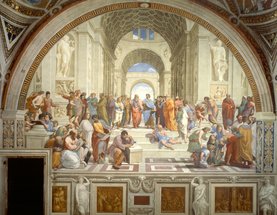 Inside Higher Ed has a story about U of St. Thomas in Houston which looks like it's forcing out its English and Philosophy faculty to make way for new STEM faculty. They say there's increased demand in the STEM fields and not enough demand in Humanities fields to justify the faculty distribution. The usual reason given for these moves is financial. Liberal Arts don't seem to offer value, i.e., for what a university spends on the liberal arts, it doesn't see commensurate gain. This sort of reasoning is not new but it is gaining ground among Catholic universities. Catholics schools appeared to be the one bastion of the liberal arts since Catholicism was endemic to the Catholic mission. This meant every Catholic education would have a foundation of theology, philosophy, and courses like English and History. What it all comes down to is measurement. How do we measure university success? If a university measures success in terms of employment rates then it stands to reason that you reapportion your resources to maximize student employment. The ancient Greeks were interesting in that it was not uncommon for what we consider professional tasks like engineering, architecture, etc, to be left to slaves or even foreigners so that the Greeks to could focus on what was really important--philosophy, mathematics, culture, etc. As long our culture is driven by economic concerns and is framed in economic terms; as long as the contextual societal debates are about how to be a real capitalist or Smith versus Marx, then the liberal arts will lose. As long as value is measured in terms of economic output, then there's no where for the liberal arts to go. It is disappointing when Catholic schools inch toward or flat out run from the Catholic idea of education since Catholic education has the opportunity to be counter-cultural on this front in a good way. Catholic education can define value in its deep, comprehensive way and eschew the move to the economic frame of defining human lives.
1 Comment
|
AuthorOno Ekeh Archives
June 2020
Categories
All
|
 RSS Feed
RSS Feed

